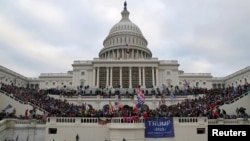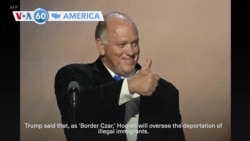U.S. President-elect Donald Trump announced Sunday that he had chosen Alina Habba, his personal attorney, to serve as counselor to the president.
Trump, in a post on his Truth Social site, called Habba a “tireless advocate for justice.”
“She has been unwavering in her loyalty and unmatched in her resolve — standing with me through numerous ‘trials,’ battles and countless days in Court," Trump said. “Few understand the Weaponization of the ‘Injustice’ System better than Alina.”
Trump announced several other planned additions to his administration, including Christopher Landau as his choice to serve as deputy secretary of state. Landau was the U.S. ambassador to Mexico during Trump’s first term.
Trump also said former National Security Council spokesman Michael Anton will serve as the director of policy planning at the State Department, while Michael Needham will serve as counselor of the State Department.
Earlier Sunday, Trump vowed to make swift and sweeping changes as he takes office on January 20, deporting millions of migrants in the country illegally, imposing tariffs on imported goods that could raise consumer prices for Americans and pardoning rioters who tried to upend his 2020 reelection loss.
Six weeks ahead of taking office for a new four-year tenure in the White House, Trump seemed emboldened by his victory last month, making him only the second American president elected to a second, nonconsecutive term after Grover Cleveland in the 1890s.
“People like me now, you know?” he told NBC’s “Meet the Press” in an interview conducted Friday in New York and broadcast Sunday.
“It’s different than the first — you know, when I won the first time [in 2016], I wasn’t nearly as popular as this,” he said. “And one thing that’s very important, in terms of the election, I love that I won the popular vote, and by a lot,” with about a 2.3 million-vote margin in his defeat of Vice President Kamala Harris out of the 155 million ballots that were cast.
But Trump, a Republican, also lapsed into familiar grievances, refusing as he has for four years to concede he lost the 2020 election to Democrat Joe Biden because of unfounded claims of fraudulent balloting and vote counting. Asked by NBC anchor Kristen Welker how, in his view, Democrats were able to steal that election but not the one a month ago, Trump said, “Because I think it was too big to rig.”
Trump blamed Biden for the nation’s political divide and heaped insults on his perceived foes, including the nine-member House of Representatives committee that spent more than a year examining the January 6, 2021, attack on the U.S. Capitol by Trump supporters trying to block lawmakers from certifying that Biden had won the 2020 election.
He called the seven Democrats and two Republicans on the investigative panel “political thugs and, you know, creeps. For what they did, honestly, they should go to jail.”
Trump said that on his first day in office he would be “acting very quickly” to pardon many of the more than 1,200 people convicted of an array of offenses linked to the rioting at the Capitol. Many of them have already completed their prison sentences while others have years to go or have to be tried. He has characterized those imprisoned as “hostages” and called them “patriots.”
“These people are living in hell,” he said.
Yet Trump said he would not appoint a special prosecutor to investigate Biden. “I’m not looking to go back into the past,” he said. “Retribution will be through success.”
But he said that if the Senate confirms his choices of former Florida state attorney general, Pam Bondi, as attorney general, and loyal political supporter Kash Patel as FBI director, they would have autonomy in deciding what to investigate and prosecute. Trump described special counsel Jack Smith, who twice indicted him, as “very corrupt.”
Trump centered much of his campaign on closing the southwestern U.S. border with Mexico and said mass deportations will begin quickly. First will be convicted criminals, he said, while other incoming Trump officials have said those with deportation orders will also be among the first to be deported.
“I think you have to do it, and it’s a hard — it’s a very tough thing to do. It’s — but you have to have, you know, you have rules, regulations, laws. They came in illegally,” he said.
Trump made no exceptions for families with mixed immigration status, where some family members are in the U.S. legally and some illegally. “I don’t want to be breaking up families, so the only way you don’t break up the family is you keep them together and you have to send them all back,” he declared.
Trump said the cost and logistical complexity of such a massive deportation plan does not faze him.
“You have no choice,” he said. “First of all, they’re costing us a fortune. But we’re starting with the criminals, and we’ve got to do it. And then we’re starting with the others, and we’re going to see how it goes.”
But he said he would attempt to work with Democratic lawmakers to exempt so-called “dreamers” from deportation, young children who were brought into the U.S. illegally by their parents and have little connection to their native countries.
He also said he will attempt to end birthright citizenship in the U.S., now embedded in the country’s Constitution, which guarantees citizenship to anyone born on U.S. soil regardless of the legality of their parents being in the U.S.
Trump said he would keep a campaign promise to levy tariffs on imports from America’s biggest trading partners, including China, Mexico and Canada. He acknowledged that he could not “guarantee American families won’t pay more” as a result of his plan.
“I can’t guarantee anything,” Trump said. “I can’t guarantee tomorrow.”
He said he is actively trying to end Russia’s war on Ukraine, “if I can.” He said Kyiv may not get as much military assistance under his administration as it has under Biden. During a political debate in September, Trump declined to say he wants Ukraine to win the war.











